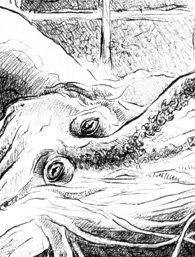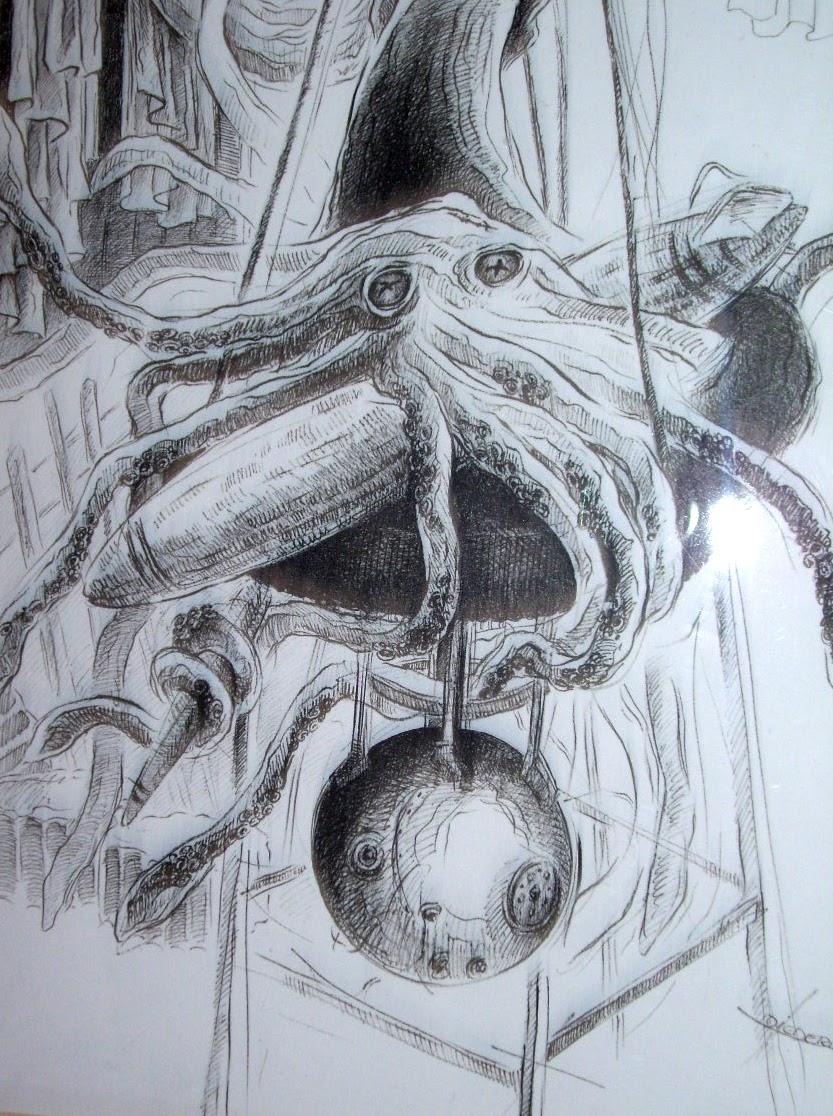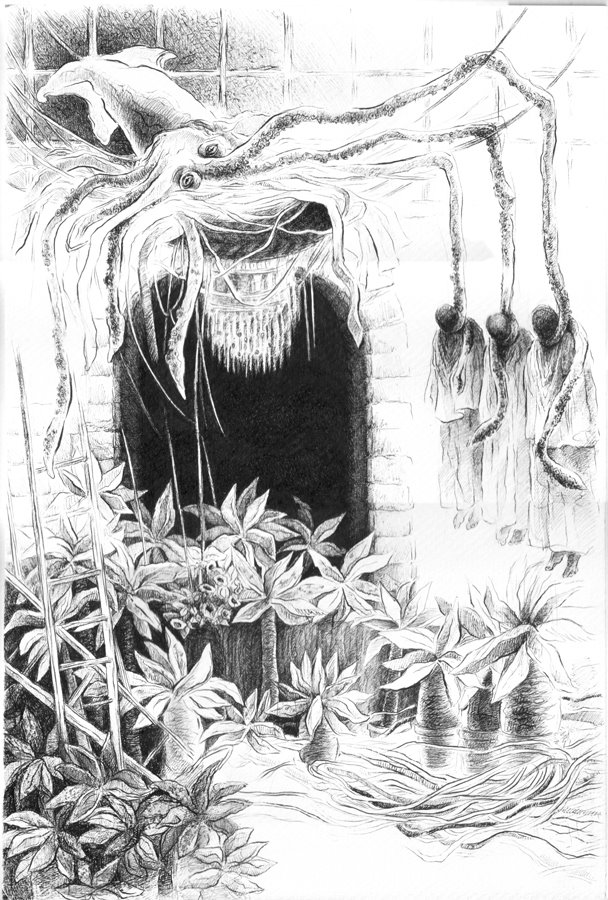
Hmmmm. You never know what you'll find cruising the back alley of Google...looks like a classmate of my daughter's. What the heck?! I wonder if many of the youth who've been under suspicion for local thefts...are possibly off the hook now?
"And I have known the eyes already, known them all-- The eyes that fix you in a formulated phrase..."


I abhor a shirt with a collar.
I've an aversion to them;
can't wear them;
can't stand to feel them behind my neck.
I don't know if it’s the extra thickness-
a minute pressure
that rides on the skin too deep.
I find I cannot take it.
It's not that they're tight
like hands around your throat
or thumbs pressing on your windpipe;
even unbuttoned,
its still an unbearable weight.
Like that guy that rested his arm
across the back of my neck
just to 'say hi'.
It feels like that:
Unwanted.
Subversive.
Additional.
Unnecessary.
A tee shirt fits just fine--
there's no constraints;
whether loose or close
you don't have to make decisions.
Men wear them. But I prefer tees.
Precisional, perfectional dress shirts
just seem like undue grief.
It’s hard to talk to one of them
with their collars.
Taut buttoned,
impressing about their throats,
like some perfect picture.
Tight.
Confining.
They all make me choke.

Once upon a time there lived in the deep wood a most beautiful child, with radiant pale skin, lovely pink rose petal lips, and hair long and sleek as a raven’s wing. Her eyes whispered dark as smoking coals and her disposition was so sweet and enthralling that even the smallest creature was immediately enraptured by her very look and gentle voice.
Shimmer, she was called, because although she lived very poorly, the animals and insects of the forests took it upon themselves to transform her meek garments into things of exquisite beauty. Her tiny white frocks were trimmed in gossamer laces, intricately woven, a gift from the forest spiders, and each gown gleamed and shone like glitter in the dappling sunlight, for every butterfly would swoop down and gently wipe his wing upon the cloth, leaving behind an everlasting sparkling gift. Shimmer, she was called, and she shimmered as she lit from flower to flower, playing and transforming her marvelous forest garden.
Now, deep within this woods, a quaint and lovely stone cottage had been occupied for many a year by Shimmer’s grandmother, a wizened white-haired old woman who took it upon herself to raise her infant granddaughter there and teach her all she knew of the ways of the forest. She was wise and nearly magical [mysterious/mystical] with her lore of plants and as Shimmer grew, flitting from one garden blossom to another, the grandmother was aware that her granddaughter too had inherited that special gift, and even more so. For not only was Shimmer gifted with plants, she could engage and tame [hear? understand?] the animals in a nearly magical fashion. [with her gentle touch and charming smile. ?]
Shimmer’s grandmother had labored nearly a lifetime around the mossy-thatched cottage, cajoling brambles of tremendous white roses to climb as high as the eaves. [clamber higher than the eaves]. Shimmer learned to trim and train their boughs too as she grew, but never did their thorny branches pierce her delicate skin. Luscious fruit trees filled the garden with ripening scent as sweet as honey and great bowers and clusters of vines and petals wove their way about other paths in the garden and in between the smoothly worn stepping stones; the pair nurtured beds of delicate lettuces, crisp vegetables, and many fragrant spices and herbs. But it was the gorgeously scented roses that were their favorite; every evening Shimmer would cut a single blossom to place within a bowl upon the hearth [mantle/old wooden table?] where its sweetness would fill the house and lull them to sleep amidst a gentle breeze.
Occupied with her little garden and beguiled by the beauty of nature, Shimmer passed nearly all the hours of her days [her waking hours?] outdoors happily completing the many tasks set out for her by her grandmother….plucking sticky ripening cherries and plums and rich berries from lowered branches, arranging jewel-toned flowers along the garden paths, digging into the dark rich loam to set forth great fat bulbs and coax delightful bouquets of blooms into fragrant displays; why, no one could be richer than they. Yet it was Shimmer’s skillful gardening that helped the grandmother produce what meager income they had—quite often a crone from the distant village would journey into the deep woods to purchase a small handful of one such healing herb or another, or a dried root, or to taste [sample] a tiny pot of fresh fruited jam or marmalade.
Such were the days that passed and as Shimmer grew more and more into a lovely young maid with alabaster skin and a delicate flushed cheek, so did the white roses begin to change…slowly at first, unnoticeable, until one day they perceived a faint pink hue had lit upon all the petals. [as subtle as…?]
It was then that the grandmother began to feel slight trepidation, a vague [stirring?] uneasiness that caused her to be sharper in tone and more watchful [hawk-eyed?] as the weeks passed by, and as the roses maintained their slight pink tinge, she called Shimmer into the cottage slightly before dusk now, sending her not quite as far a field when in search for a particular rare root or leaf. Whereas their evenings had previously consisted of an amusing animal story or occasional folklore tale, now the old woman hovered closer, gruffly mumbling warnings and parables [accounts] of a creature she called ‘man’.
Shimmer perceived that her grandmother’s worries had something to do with the odd white [oddly colored] roses and easing her mind, would nod her head in agreement that these creatures should be avoided, even though she knew not what they were…She listened carefully to the joyous singing of the birds and the bright humming insects and the tiny squeaks of the sweet grey mice and knew there was no danger about. She doted on her grandmother, soothing her anxious headaches with cool berry-scented water and honeyed teas and attributed the old woman’s tales to the older crones’ neighborly gossip.
However, despite the love Shimmer had for the chattering and songs of her dear forest friends there were times when she felt slightly apart, for although they chirped and twittered with her daily, she was not really like them at all…

Leroy Raugowitz was slapped hard across the cheek and chained to a bed when he was of the age of four.
This was a normal household routine and substantiated by the hunger, sarcasm, and gross ill will that comes to all bad boys that are born poor and undesired. All his life Leroy would remember his first meal at an all-night diner that served the finest fried chicken and smoothest mashed potatoes he had ever seen and then the night spent on a soft bed tucked between clean white sheets.
He would always remember the night he left his meager life as a child of chains, to a glorious two-day escapade of real food, fairy-tale freedom, on to a new unknown eternity of chance—one consisting of criticism and doom. It would be hard to determine which life was worst.
The midnight Leroy awoke in snowy sheets remained crisp in his mind forever—his legs were free to move about, unrestrained; he could stretch and wiggle and dig his toes into their starchiness. And with a belly full and taut, his eyes wide, he glanced about at cleanliness for the first time in his existence. A brief smile fluttered on his lips before he let the enveloping softness carry him back to sleep. It was heaven.
It didn’t last long.
For two days, ever since the nice men in blue uniforms with shiny gold buttons had taken pictures and broken through the heavy hasp, and the mustached man in the white coat had stroked his chin, peering into the black bag, peering at his raw ankle, and the matronly dark-haired women, Leda, methodically wrote notes with a sharpened pencil while shaking her head and staring about the room, well, Leroy got to see how a real boy lived.
For two days, he was treated like a real boy, in a real home, with a real life. It remained with him eternally.
He was scooped gently over the shoulder of one the blue-clad officers and placed in an automobile to be driven to a stoic, dull brown-brick building used for Official Purposes. He answered to what questions he was capable, then again placed in the automobile, where, after his chicken and mashed potato supper, he was served his first dessert. It was a magnificent creation; a piece of real cherry pie in a golden sugary crust and running with sweet red juices, topped with a scoop of ice cream. He saw this jewel pass before his widened eyes on its way to another customer, which made Leda nearly smile—she immediately called to the waitress, who brought one right over. Of course, he couldn’t finish it, which made him afraid, but it was apparent that his matronly caregiver was in a hurry and soon they were driving to a new location, a few meager cherries left drowning in a sea of pink.
He lived the life of what he determined must be ‘royalty’ for two days; his first experience being that of a warm bath; an immersion into a frothy warm mass of fragrant bubbles. Someone, a lavender-scented woman with short blond waves, bathed him, fawning over and delicately rubbing and rinsing him from head to toe. He was petted and dried and enveloped between layers of a thick creamy towel, so warm and soothing he nearly dozed.
He saw new clothing laid out on a dresser before him: light blue flannel pajamas with clouds and red bi-planes, new pants and a tiny striped tee, all complete with stickered prices still attached. While his ankle was delicately re-bandaged, he ogled the clothing and smiled to himself again: these would be the first new clothes he had ever had.
The pajamas were divine.
(More later. Much Later.)


2 comments:
why off the hook?
Some of them were blamed for a crime they didn't commit.
Post a Comment